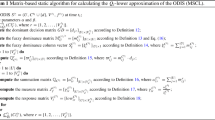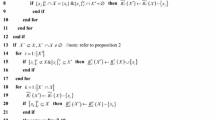Abstract
In practical applications, there exist lots of ordered information systems (OISs). In the process of dealing with OISs, dominant preference, which plays a significant role in decision making, should be taken into consideration. With the increasing of data capacity, OISs often evolve with time. In order to extract updated knowledge from evolving ordered data, we have to elaborate computation efforts to re-calculate entire data, which consumes a significant computational cost. Therefore, the computational efficiency is extremely low. In response to this challenge, matrix-based dynamic dominance-based multigranulation rough sets (DMGRSs) approaches, which can improve computational efficiency for updating knowledge, are explored to update multigranulation approximations in dynamic ordered information systems with evolving data. To begin with, we present a matrix representation of dominance-based multigranulation approximations according to the dominant relation matrix and relevant column vectors of each granular structure. Afterwards, the incremental strategies to update dominance-based multigranulation approximations in OISs are proposed when adding or deleting objects. Furthermore, the corresponding dynamic algorithms, which avoid some unnecessary calculations, are explored in DMGRSs. Finally, extensive experiments carried out on nine UCI data sets indicate that the explored dynamic algorithms can achieve promising performance.




Similar content being viewed by others
References
Cai MJ, Li QG, Ma JM (2017) Knowledge reduction of dynamic covering decision information systems caused by variations of attribute values. Int J Mach Learn Cybern 8(4):1131–114
Chakhar S, Saad I (2012) Dominance-based rough set approach for groups in multicriteria classification problems. Decis Support Syst 54:372–380
Che XY, Mi JS (2019) Attributes set reduction in multigranulation approximation space of a multi-source decision information system. Int J Mach Learn Cybern 10(9):2297–2311
Chen DG, Yang YY, Dong Z (2016) An incremental algorithm for attribute reduction with variable precision rough sets. Appl Soft Comput 45:129–149
Chen HM, Li TR, Ruan D et al (2013) A rough-set-based incremental approach for updating approximations under dynamic maintenance environments. IEEE Trans Knowl Data Eng 25(2):274–284
Chen HM, Li TR, Luo C et al (2014) A rough set-based method for updating decision rules on attribute values’ coarsening and refining. IEEE Trans Knowl Data Eng 26(12):2886–2899
Chen HM, Li TR, Luo C et al (2015) A decision-theoretic rough set approach for dynamic data mining. IEEE Trans Fuzzy Syst 23(6):1958–1979
Cheng Y (2018) Dynamic maintenance of approximations under fuzzy rough sets. Int J Mach Learn Cybern 9(12):2011–2026
Du WS, Hu BQ (2016) Dominance-based rough set approach to incomplete ordered information systems. Inf Sci 346–347:106–129
Greco S, Matarazzo B, Slowinski R (1999) Rough approximation of a preference relation by dominance relations. Eur J Oper Res 117:63–83
Greco S, Matarazzo B, Slowinski R (2002) Rough approximation by dominance relations. Int J Intell Syst 17(2):153–171
Hao C, Li JH, Fan M, Liu WQ, Tsang ECC (2017) Optimal scale selection in dynamic multi-scale decision tables based on sequential three-way decisions. Inf Sci 415:213–232
Hu CX, Liu SX, Huang XL (2017) Dynamic updating approximations in multigranulation rough sets while refining or coarsening attribute values. Knowl Based Syst 130:62–73
Hu CX, Liu SX, Liu GX (2017) Matrix-based approaches for dynamic updating approximations in multigranulation rough sets. Knowl Based Syst 122:51–63
Hu CX, Zhang L, Wang BJ, Zhang Z, Li FZ (2019) Incremental updating knowledge in neighborhood multigranulation rough sets under dynamic granular structures. Knowl Based Syst 163:811–829
Hu J, Li TR, Luo C, Fujita H, Yang Y (2017) Incremental fuzzy cluster ensemble learning based on rough set theory. Knowl Based Syst 132:144–155
Huang YY, Li TR, Luo C, Fujita H, Horng SJ (2017) Matrix-based dynamic updating rough fuzzy approximations for data mining. Knowl Based Syst 119:273–283
Huang QQ, Li TR, Huang YY, Yang X, Fujita H (2020) Dynamic dominance rough set approach for processing composite ordered data. Knowl Based Syst 187:104829
Jiang ZH, Yang XB, Yu HL, Liu D, Wang PX, Qian YH (2019) Accelerator for multi-granularity attribute reduction. Knowl Based Syst 177:145–158
Jing YG, Li TR, Fujita H, Yu Z, Wang B (2017) An incremental attribute reduction approach based on knowledge granularity with a multi-granulation view. Inf Sci 411:23–38
Jing YG, Li TR, Fujita H, Wang BL, Cheng N (2018) An incremental attribute reduction method for dynamic data mining. Inf Sci 465:202–218
Ju HR, Yang XB, Song XN, Qi YS (2014) Dynamic updating multigranulation fuzzy rough set: approximations and reducts. Int J Mach Learn Cybern 5(6):981–990
Lang GM, Miao DQ, Yang T, Cai MJ (2016) Knowledge reduction of dynamic covering decision information systems when varying covering cardinalities. Inf Sci 346–347:236–260
Lang GM, Li QG, Cai MJ et al (2017) Incremental approaches to knowledge reduction based on characteristic matrices. Int J Mach Learn Cybern 8(1):203–222
Li JH, Ren Y, Mei CL, Qian YH, Yang YB (2016) A comparative study of multigranulation rough sets and concept lattices via rule acquisition. Knowl Based Syst 91:152–164
Li JH, Huang CC, Qi JJ, Qian YH, Liu WQ (2017) Three-way cognitive concept learning via multi-granularity. Inf Sci 378:244–263
Li SY, Li TR, Liu D (2013) Incremental updating approximations in dominance-based rough sets approach under the variation of the attribute set. Knowl Based Syst 40:17–26
Li SY, Li TR, Liu D (2013) Dynamic maintenance of approximations in dominance-based rough set approach under the variation of the object set. Int J Intell Syst 28(8):729–751
Li Y, Jin YF, Sun XD (2018) Incremental method of updating approximations in DRSA under variations of multiple objects. Int J Mach Learn Cybern 9:295–308
Liang JY, Mi JR, Wei W, Wang F (2013) An accelerator for attribute reduction based on perspective of objects and attributes. Knowl Based Syst 44:90–100
Liu D, Liang DC (2017) Three-way decisions in ordered decision system. Knowl Based Syst 137:182–195
Liu D, Li TR, Zhang JB (2014) A rough set-based incremental approach for learning knowledge in dynamic incomplete information systems. Int J Approx Reason 55(8):1764–1786
Liu D, Li TR, Ruan D, Zhang JB (2011) Incremental learning optimization on knowledge discovery in dynamic business intelligent systems. J Glob Optim 51(2):325–344
Liu GL (2008) Axiomatic systems for rough sets and fuzzy rough sets. Int J Approx Reason 48:857–867
Lin GP, Liang JY, Qian YH (2014) Topological approach to multigranulation rough sets. Int J Mach Learn Cybern 5(2):233–243
Liu KY, Yang XB, Yu HL, Mi JS, Wang PX, Chen XJ (2019) Rough set based semi-supervised feature selection via ensemble selector. Knowl Based Syst 165:282–296
Luo C, Li TR, Yao YY (2017) Dynamic probabilistic rough sets with incomplete data. Inf Sci 417:39–54
Luo C, Li TR, Yi Z, Fujita H (2016) Matrix approach to decision-theoretic rough sets for evolving data. Knowl Based Syst 99:123–134
Luo C, Li TR, Chen HM, Fujita H, Yi Z (2018) Incremental rough set approach for hierarchical multicriteria classification. Inf Sci 429:72–87
Li TR, Ruan D, Geert W et al (2007) A rough sets based characteristic relation approach for dynamic attribute generalization in data mining. Knowl Based Syst 20(5):485–494
Pawlak Z (1982) Rough sets. Int J Comput Inf Sci 11:341–356
Qian YH, Li SY, Liang JY, Shi ZZ, Wang F (2014) Pessimistic rough set based decisions: a multigranulation fusion strategy. Inf Sci 264(20):196–210
Qian YH, Liang JY, Dang CY (2010) Incomplete multigranulation rough set. IEEE Trans Syst Man Cybern Part A 40(2):420–431
Qian YH, Liang JY, Yao YY, Dang CY (2010) MGRS: a multi-granulation rough set. Inf Sci 180(6):949–970
Tan AH, Wu WZ, Tao YZ (2017) On the belief structures and reductions of multigranulation spaces with decisions. Int J Approx Reason 88:39–52
Tan AH, Wu WZ, Shi WS, Zhao SM (2019) Granulation selection and decision making with multigranulation rough set over two universes. Int J Mach Learn Cybern 10:2501–2513
Wang S, Li TR, Luo C, Hu J, Fujita H, Huang TQ (2020) A novel approach for efficient updating approximations in dynamic ordered information systems. Inf Sci 507:197–219
Wei W, Song P, Liang JY, Wu XY (2019) Accelerating incremental attribute reduction algorithm by compacting a decision table. Int J Mach Learn Cybern 10:2355–2373
Wei W, Wu XY, Liang JY et al (2018) Discernibility matrix based incremental attribute reduction for dynamic data. Knowl Based Syst 140:142–157
Wu WZ, Qian YH, Li TJ, Gu SM (2017) On rule acquisition in incomplete multi-scale decision tables. Inf Sci 378:282–302
Xu WH, Wang QR, Luo SQ (2014) Multi-granulation fuzzy rough sets. J Intell Fuzzy Syst 26:1323–1340
Xu WH, Sun WX, Zhang XY, Zhang WX (2012) Multiple granulation rough set approach to ordered information systems. Int J Gen Syst 41(5):475–50
Yang B, Hu BQ (2018) Matrix representations and interdependency on \(L\)-fuzzy covering-based approximation operators. Int J Approx Reason 96:57–77
Yang X, Li TR, Liu D, Chen HM, Luo C (2017) A unified framework of dynamic three-way probabilistic rough sets. Inf Sci 420:126–147
Yang XB, Qi Y, Yu HL, Song XN, Yang JY (2014) Updating multigranulation rough approximations with increasing of granular structures. Knowl Based Syst 64:59–69
Yang XB (2011) The models of dominance-based multigranulation rough sets. In: Proceedings of the 7th international conference on intelligent computing, pp 657–664
Yang YY, Song SJ, Chen DG, Zhang X (2019) Discernible neighborhood counting based incremental feature selection for heterogeneous data. Int J Mach Learn Cybern. https://doi.org/10.1007/s13042-019-00997-4
Yang YY, Chen DG, Wang H (2017) Active sample selection based incremental algorithm for attribute reduction with rough sets. IEEE Trans Fuzzy Syst 25(4):825–838
Yao YY, She YH (2016) Rough set models in multigranulation spaces. Inf Sci 327:40–56
Yao YY (2019) Tri-level thinking: models of three-way decision. Int J Mach Learn Cybern. https://doi.org/10.1007/s13042-019-01040-2
Yao YY, Zhang XY (2017) Class-specific attribute reducts in rough set theory. Inf Sci 418:601–618
Yu JH, Chen MH, Xu WH (2017) Dynamic computing rough approximations approach to time-evolving information granule interval-valued ordered information system. Appl Soft Comput 60:18–29
Yu JH, Xu WH (2017) Incremental knowledge discovering in interval-valued decision information system with the dynamic data. Int J Mach Learn Cybern 8(3):849–864
Yu PQ, Wang HK, Li JJ, Lin GP (2019) Matrix-based approaches for updating approximations in neighborhood multigranulation rough sets while neighborhood classes decreasing or increasing. J Intell Fuzzy Syst 37:2847–2867
Zhang C, Li DY, Zhai YH, Yang YH (2019) Multigranulation rough set model in hesitant fuzzy information systems and its application in person-job fit. Int J Mach Learn Cybern 10(4):717–729
Zhang JB, Li TR, Ruan D, Liu D (2012) Rough sets based matrix approaches with dynamic attribute variation in set-valued information systems. Int J Approx Reason 53(4):620–635
Zhang JB, Li TR, Chen HM (2014) Composite rough sets for dynamic data mining. Inf Sci 257:81–100
Zhang JB, Wong JS, Pan Y, Li TR (2015) A parallel matrix-based method for computing approximations in incomplete information systems. IEEE Trans Knowl Data Eng 27(2):326–339
Acknowledgements
We would like to thank the editors and anonymous reviewers for their constructive comments and valuable suggestions. This work is supported in part by the Natural Science Foundation of China (Nos. 61672364, 61602327), the Anhui Provincial Natural Science Foundation (Nos. 1808085MF170, KJ2018A0432, KJ2017B15, KJ2018B03), the Six Talent Peak Project of Jiangsu Province of China, the Collaborative Innovation Center of Novel Software Technology and Industrialization, the Postgraduate Research and Practice Innovation Program of Jiangsu Province (No. KYCX19_1929), the Natural Science Foundation of the Jiangsu Higher Education Institutions of China (No. 19KJA550002), and Anhui Provincial Key Laboratory of Network and Information Security (No. AHNIS2020002).
Author information
Authors and Affiliations
Corresponding author
Ethics declarations
Conflict of interest
The authors declare that they have no conflict of interest.
Additional information
Publisher's Note
Springer Nature remains neutral with regard to jurisdictional claims in published maps and institutional affiliations.
Rights and permissions
About this article
Cite this article
Hu, C., Zhang, L. Dynamic dominance-based multigranulation rough sets approaches with evolving ordered data. Int. J. Mach. Learn. & Cyber. 12, 17–38 (2021). https://doi.org/10.1007/s13042-020-01119-1
Received:
Accepted:
Published:
Issue Date:
DOI: https://doi.org/10.1007/s13042-020-01119-1




